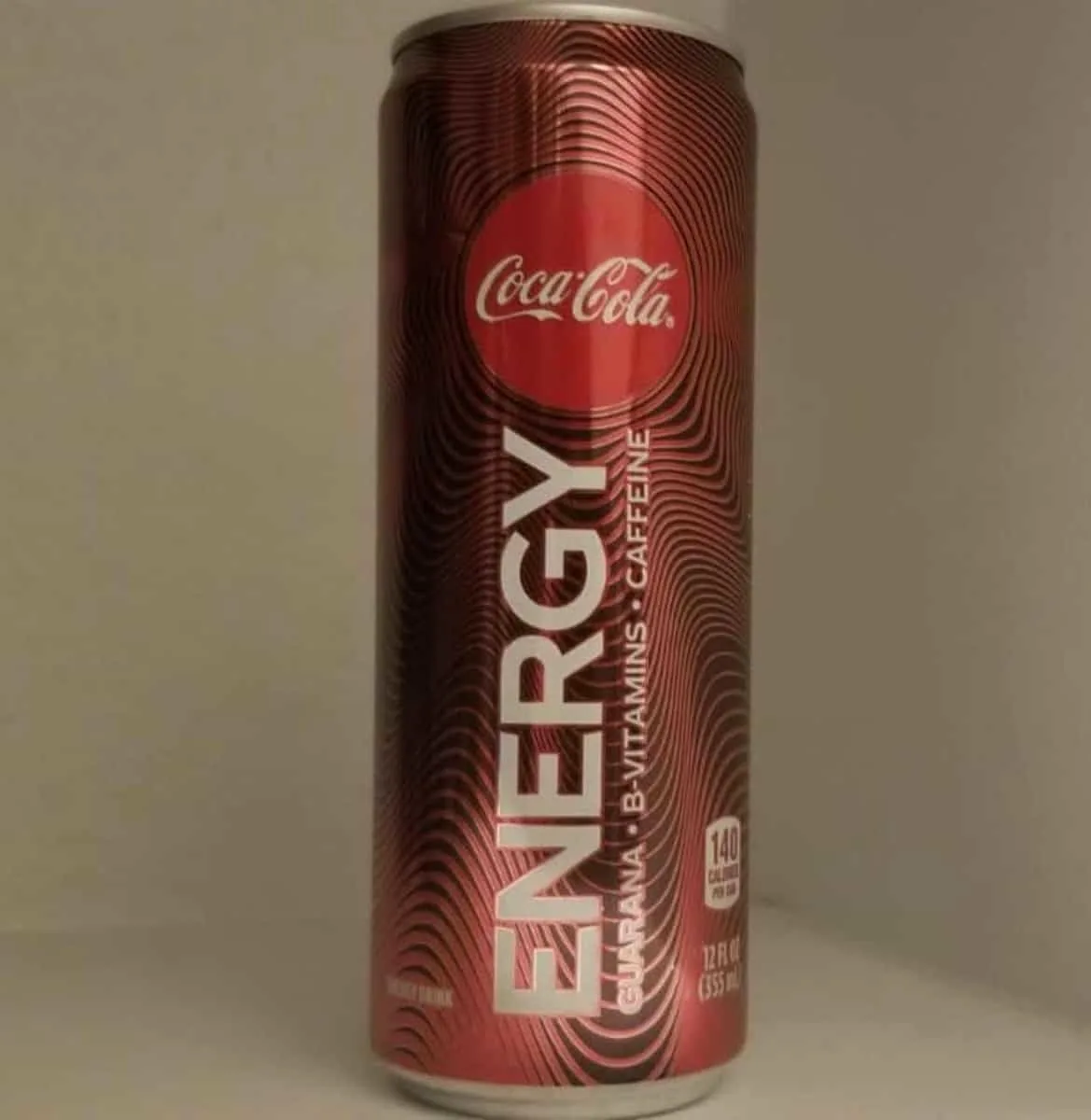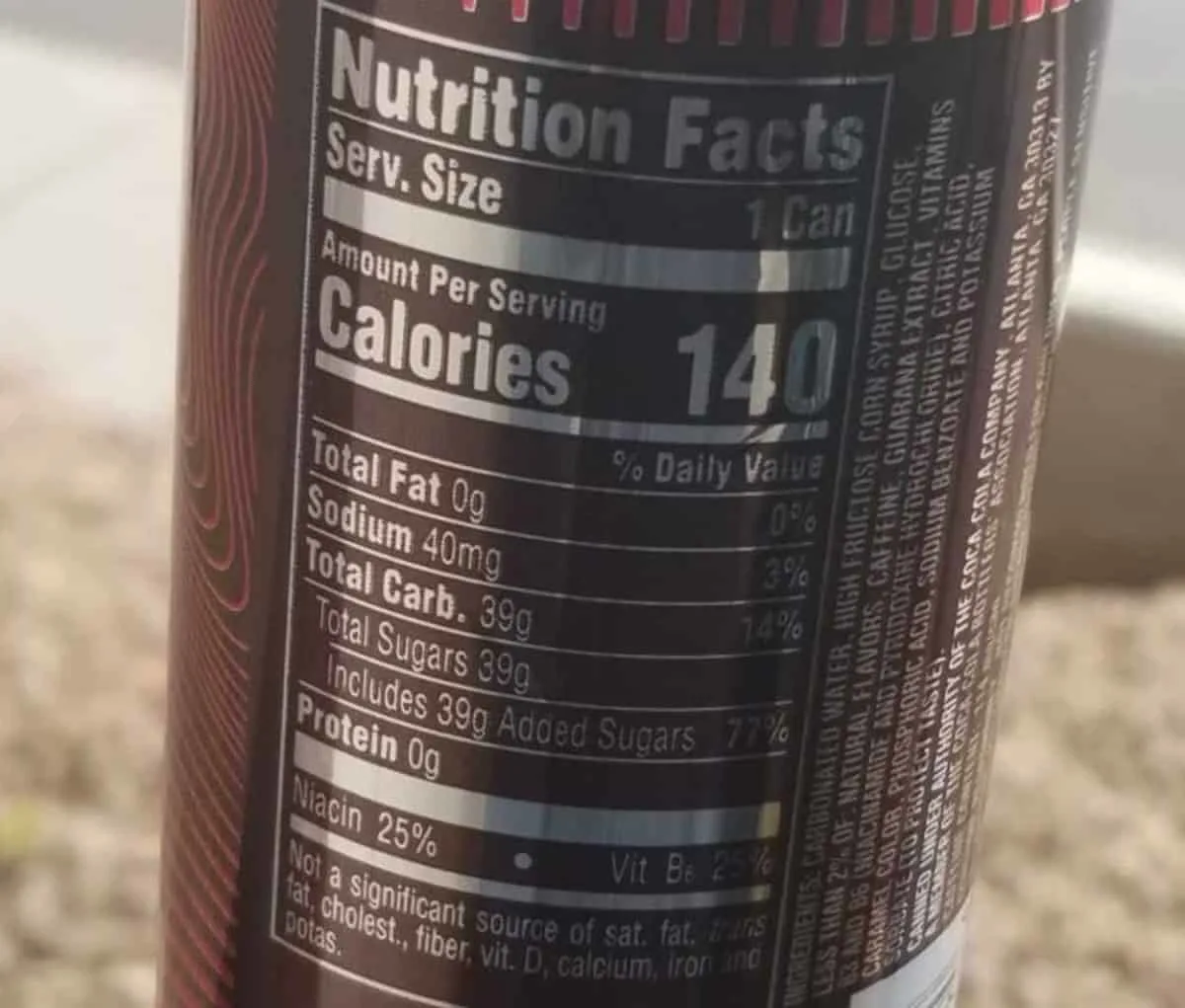You’re probably here because you just heard that one of the world’s leading multinational beverage corporations, Coca-Cola, has launched their energy drink called Coca-Cola Energy.

But what can you expect from it in terms of its overall nutritional values?
Well, Coca-Cola Energy has 114mg of caffeine, which is a lot more than the original soda. A 12 fl.oz can of this drink also contains a whopping 39g of sugar and beneficial ingredients such as guarana extracts and B-Vitamins.
Keep on reading to find out more about the nutrition facts of Coca-Cola Energy and how it affects your health.
Contents
What Are The Nutrition Facts of Coca-Cola Energy?
The nutritional values of each can of Coca-Cola Energy Drink per 12 fl.oz are as below:
| Typical Value (Standard Serving) | Coca-Cola Energy (12 fl.oz) |
| Energy | 140 calories |
| Protein | 0g |
| Fat (Of which Saturated) | 0g (0g) |
| Carbohydrates (Of which Sugars) | 39g (39g) |
| Caffeine | 114mg |
| Sodium | 80mg |

What Are The Ingredients In Coca-Cola Energy?
The ingredients present in a 12 fl.oz can of Coca-Cola Energy are as below:
- Carbonated water
- High Fructose Corn Syrup
- Glucose
- Caffeine
- Guarana Extract
- Citric Acid
- Caramel color
- Sodium Bicarbonate
- Phosphoric Acid
- Vitamins B3 (Niacinamide)
- Vitamins B6 (Pyridoxine Hydrochloride)
- Sodium Benzoate
- Potassium Sorbate
How Many Calories Are There In A Coca-Cola Energy Drink?
A standard 12 fl.oz can of Coca-Cola Energy contains around 140 calories, which is still a considerable amount of calories to include in your regular diet.
Although the 140 calories in Coca-Cola Energy isn’t as high compared to a 16 fl.oz can of Monster with 210 calories, it’s still something to look out for. You may want to opt for other energy drinks that have fewer calories if you’re trying to lose weight or on a strict diet.
But if you’re someone who hits the gym regularly, I think Coca-Cola Energy would be a great pre-workout drink for extra calories to burn off during your workout.
For reference, the recommended calorie intake per day should be around 2,000 – 2,500 calories, according to experts.
While a can of Coca-Cola Energy won’t take up so much of your daily limit, it’s still best to practice self-control and not use this drink as a meal replacement.
Generally speaking, energy drinks can’t provide you with all the nutrients your body needs to keep going, so it’s important to eat a properly balanced meal.
How Much Caffeine Is In A Coca-Cola Energy Drink?
Coca-Cola Energy contains 114mg of caffeine in a 12 fl.oz can, which is quite a high amount of caffeine for its size.
Caffeine is a natural stimulant that helps us stay awake and alert. Consuming caffeine provides us with the energy boost we need during our tiring days.
While it’s clear why caffeine is the key ingredient in energy drinks, I still think the 114mg of caffeine in Coca-Cola Energy is a little more than the ideal amount.
I only consume around 50mg to 100mg of caffeine, and Coca-Cola Energy’s caffeine content of 114mg per serving goes beyond that limit. I try to avoid highly caffeinated beverages as I don’t enjoy the side effect of too much caffeine.
According to research, caffeine peaks within an hour after consumption and eliminating caffeine in our system takes around four to six hours, which is why caffeine is known to have a half-life.
It’s also important to note that the effects will vary depending on your own caffeine metabolism. Coca-Cola Energy’s caffeine content may be a little too much for you if you’re someone who has a low caffeine tolerance.
Though, I still don’t recommend you reach out for multiple cans of this drink at once, even if you’re an avid caffeine drinker.
According to the FDA, the recommended daily intake of caffeine is not more than 400mg, so regularly going over this limit can bring about several health risks such as:
- Restlessness
- Jittery feeling
- Insomnia
- Headaches
- Dizziness
- Rapid
- Palpitations
- Dehydration
- Anxiety
- Dependency
It’s also worth noting that caffeine crashing is possible when you include a highly caffeinated energy drink like Coca-Cola Energy in your diet.
It’s the result of the lack of sleep or consuming too much caffeine. Not many people know this, but symptoms of caffeine crashing can last from hours to a week.

But of course, caffeine works differently for everybody so if you’re still keen on having Coca-Cola Energy, make sure to consume it in moderation.
How Much Sugar Are There In A Coca- Cola Energy Drink?
There’s 39g of sugar in a 12 fl.oz can of Coca-Cola Energy. I think that’s way too much sugar to be consuming daily.
Coca-Cola Energy’s sugar content goes way beyond the AHA‘s recommendation of daily sugar intake for healthy adults:
| Gender | Recommended Daily Sugar Intake by AHA |
| Women | 25g / 100 kcal / 6 tsp |
| Men | 36g / 150 kcal / 9 tsp |
As you can see, a single can of Coca-Cola Energy with its 39g of sugar will definitely make you exceed your daily limit.
While it’s fine to indulge in the sweetness sugar has to offer once in a while, consuming an excessive amount can lead to major health problems such as:
- Acne
- Obesity
- Heart disease
- Diabetes
- Cancer
- Depression
In addition, some studies prove overconsumption of sugar can potentially drain your energy. We believe that sugar can spike up our energy levels. Hence, the concept of “sugar rush”.
It’s proven that some of these empty calories, especially those from added sugar, can trigger feelings of tiredness and sadness instead.
Overall, the safest and healthiest way to consume Coca-Cola Energy is to have it occasionally and limit yourself to just one can. It’s also best to only drink half of the can first and save the other half later.
This way, you won’t put your body in total shock due to the high amount of sugar in this drink. Another tip for monitoring your overall sugar intake is being aware of the label and added sugars included in your energy drinks.
Other Ingredients
Vitamins and Minerals
Coca-Cola Energy is advertised as an energy drink that contains B-Vitamins, namely vitamin B6 and B3.
Vitamin B3, also known as niacin, is a great added ingredient to consume as it helps increases brain power and lowers down diabetes.
While Coca-Cola Energy’s vitamin content is an added advantage, you should avoid having too many vitamins as it can lead to side effects such as diarrhoea, nausea and even hair loss. So, be mindful of your overall vitamin intake!
High Fructose Corn Syrup
High Fructose Corn Syrup (HFCS) is an added sugar made from corn syrup. Many processed foods and drinks use it due to its fructose content and this includes Coca-Cola Energy.
However, there are many ongoing concerns about the use of HFCS and its possible long-term effects. Research shows that overconsumption can trigger diabetes and metabolic health syndrome.
But as long as you’re careful of your consumption and lead a relatively healthy lifestyle, I don’t think you should be worried too much about the HFCS in Coca-Cola Energy.
Guarana Extract
Besides caffeine, Coca-Cola Energy also contains Guarana, a plant named by the Guarani tribe located in Amazon.
This ingredient is popular due to its stimulant properties that are 400 times stronger than the caffeine from coffee beans. Its benefits include:
- Reduces fatigue
- Promotes weight loss
- Boosts heart health
- Improves skin appearance
- Provides pain relief
Like the other ingredients, high levels of guarana can be dangerous as it can increase your heart rate by speeding up your nervous system. The caffeine in guarana can also cause serious heart problems and lead to high blood pressure when accompanied by stimulant drugs.
This is definitely something to be cautious of, especially if you’re sensitive to caffeine.
Is Coca-Cola Energy Taurine-Free?
Coca-Cola Energy is indeed taurine-free.
While taurine can be used as a supplement to promote metabolism and produce protein, it’s also one of the most dangerous ingredients found in energy drinks if taken excessively.
It’s found that overconsumption of taurine together with caffeine and added sugar can bring about adverse effects to your body, including an increase in your heart rate and blood pressure. Thankfully no taurine here!
Is Coca-Cola Energy Drink Bad?
Coca Cola Energy drink isn’t the healthiest choice out there due to its high sugar content, but I won’t go as far as labelling is dangerous per se. It’s only bad if you don’t control your intake or already have a medical condition.
I must admit I’m not a fan of the 114mg of caffeine in Coca-Cola Energy as it’s way above the limit of what I usually go for. But if you’re someone with high caffeine metabolism, this drink will work wonders for you.
While you’ll definitely benefit from the energy boost, you should still be careful of the 39g of sugar present in just one can of this drink alone!
Because of the large amounts of sugar in this drink, which is beyond the recommended daily sugar consumption, I wouldn’t advise anyone to have Coca-Cola Energy regularly.
Although you might think all that sugar won’t affect you much if you’re already an active person, it’s still crucial to be mindful that overconsumption will lead to several health risks.
According to this research, energy drinks, in general, can be dangerous because of their high amounts of caffeine and sugar. Thus, if you’re underage, pregnant, breastfeeding or already suffer from health conditions, it’s best to avoid this energy drink.
That said, if you don’t belong to any of those groups, I would still advise you to drink Coca-Cola Energy when you need an energy boost and have one can only. It’s also always a good idea to check in with your health specialist first before including this sugary energy drink in your regular diet.
Coca-Cola Energy Drink Flavors
In my opinion, the Coca-Cola Energy brand doesn’t really offer you much in terms of flavoring as there are only two types of flavors to choose from:
- Coca-Cola Energy
- Coca-Cola Energy Cherry
The good thing is that these two flavors come with sugar-free versions, so I highly recommend opting for those if you do plan on making this a go-to energy drink.
If you’re interested in a review of the Coca-Cola Energy drink, check out the video below:
Conclusion
As a Coca Cola fan myself, the biggest downside of its energy drink version is the insanely high levels of sugar present in just one 12 fl.oz can. Not to mention, all that sugar also comes with other added ingredients that pose health risks.
I think Coca-Cola Energy isn’t the best option for an energy drink, regardless of whether you have any pre-existing conditions. It just has way too much sugar to be consumed regularly.
Plus, there’s plenty of other energy drinks out there that are low in sugar, and some are sugar-free even. I think they’re much healthier.
That said, if you still insist on drinking this energy drink, my advice is to have it occasionally and drink only half the can first. It’s also best to keep your weekly intake of Coca-Cola Energy to a maximum of only two cans.
